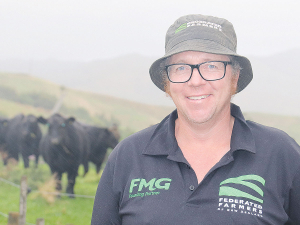Editorial: Having a rural voice
OPINION: The past few weeks have been tough on farms across the North Island: floods and storms have caused damage and disruption to families and businesses.
 Gisborne farmer and Feds leader Toby Williams says it will take some farmers between five and ten years and cost up to $2million to get their properties back to pre-Cyclone Gabrielle level.
Gisborne farmer and Feds leader Toby Williams says it will take some farmers between five and ten years and cost up to $2million to get their properties back to pre-Cyclone Gabrielle level.
Feeling forgotten and in a fragile space financially and mentally.
That's how Toby Williams, Federated Farmers meat and wool group chair and national board member, who farms near Gisborne, describes the state of farmers in Tairāwhiti and northern Hawke's Bay.
He says it will take some farmers between five and ten years and cost up to $2 million to get their properties back to where they were before Cyclone Gabrielle and a succession of other rain events struck th region.
He says right now farmers are feeling the pinch financially, their wallets are locked away and they are only spending on essential items.
Williams himself is based near the settlement of Whangara, about 30 minutes drive north of Gisborne up State Highway 2. He winters 13,000 stock units on his medium steep hill country property. They run about 400 heifers and cows, lamb 3500 ewes and 1000 hoggets, all finished on the farm.
His family are well known in the district and in the last few years he and his brother completed a deal with the family for them to run their own farms.
He came back to farming after completing a degree in economics at Canterbury University and has been on the present farm for the past eleven years.
"We had over three metres of rain through (cyclones) Hale and Gabrielle last year and our annual rainfall is about 12000mm - so it's triple the average rainfall. But you can almost go back to 2018 and the Queen's Birthday floods at Tolaga By which hit us here at Whangara. That event didn't hit the whole district and believe it or not, at the time, half of Gisborne was enduring a crippling drought," he says.
Williams says most of the rain events didn't make the national news, but for example, he was hit by a huge storm that came right before weaning and it took out huge chunks of land.
"For us that was bigger than Gabrielle and Hale. But then two weeks after Gabrielle we had another 300 or 400mm over the next weekend, which didn't get media attention, and more rain kept coming in June and July accentuating the damage," he says.
Driving around Williams's farm, there is plenty of evidence of the damage caused by the rain, and his property is far from the worst in the region. Slips are everywhere and temporary fencing is being used because the land is still slipping. Poplar poles are extensively planted around the hills to try and stop the land slipping even more, but that is still a losing battle with mother nature.
"In our case, every paddock has got some slips, and we have quite strong country. In some ways it's amazing how well the farm has held together. But the problem is the ongoing slumping of the land, which is waterlogged, and our fences are no longer straight. Our fences run for two or three kilometres - not just a few hundred metres," he says.
Could a breakthrough in fermentation create a new multi-million-dollar export market for shiitake mushroom extracts into China?
Meadow Fresh has created the world's first fantasy sports league powered by real cows.
This year, 'Foodie February' sees potatoes take the spotlight as one of New Zealand's most powerful and versatile food heroes.
A multi-cultural team is helping to establish one of New Zealand's largest plantings of premium eating grapes - while learning each other's languages and cultures along the way.
The World Wide Sires National All Day Breeds Best Youth Camp Best All Rounder plaudit has become family affair, with 2026 Paramount Cup winner Holly Williams following in her sister Zara's footsteps.
DairyNZ is giving New Zealand farmers a unique opportunity to gain hands-on governance and leadership experience within the dairy sector.